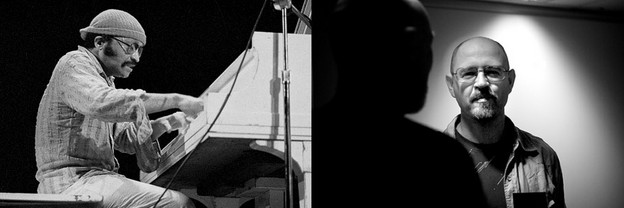
First reading of Cecil Taylor's '#6.56' (1)
Michael Farrell

The first thing I’m concerned with when hearing a poem read, especially if there’s no text in hand, which of course I can’t tell in this case, is the manner of the poet’s speaking: their pronunciation, phrasing, rhetorical emphasis, tone, accent, cadence, etc. Do they let their words speak, or do they tell us how meaningful each word is by their emphasis? Do they sound completely phony through trying to sound sincere? With a sound poem this is less of an issue; yet I’m still listening for cliché, something I’m less expert at perceiving, however, having heard less sound poetry than spoken word. I’m also more familiar with experimental improvised music than with (free) jazz as such, and I’m not even sure what their connection is. I couldn’t hear a lot of the words Taylor said at the beginning. The assemblage of words, vocal sounds, and instrument sounds, means variety is more easily achieved. It seems like there’s a chanting “giving of wisdom” that is undercut by mouth noise and absurd announcements or orders. It evokes a play, a kids’ TV show. Because of the format I keep pausing to write, so my experience is different from one of hearing it live, or if I didn’t pause it and had written this text after. It’s very different from seeing a poet’s face also, whether live or on YouTube, and being distracted by their looks, dress, what they do with their faces and bodies; their affect. Live there is no time measurement: listening to an MP3, I know how much I’ve heard, how much to go. It often isn’t clear whether words or non-semantic sounds are being uttered. It feels absurd, in the meta sense of course. What I’m hoping not to hear is anything too mannered or too trippy: this is part of the suspense. I then realise that the orchestrated world being created through sound is in opposition to the visual white line going across the black screen. This is design; style; while the sound, which comes from no apparent location, evokes the cosmopolitanism of complicated cubism. Though presumably it is just the one voice, different intonations and types of things said and sounded, create characters which could probably be delineated as the text became familiar, and listened to with other tracks from Taylor’s oeuvre. Stopping to write means I’m not immersed, it isn’t escapist. It also means there’s no sense of building or climax, rather the heightened suspense of seeing the end approach, at 6.02 of seven minutes. I both put off the end and get distracted, put cream on my foot. It seemed like seven minutes was too long and would never end, and now at 6.49 I put off the end, thinking that it could go on much longer. Yet it has already done, given, so much. At the same time, I am thinking of it as an obligation that is almost fulfilled. It ends quietly. Can the last words have been Japanese? I cheat, play the last bit again, but I’m still not sure. I check the title, usually for me so important: it’s “#6.56,” so probably it ended at 6.56.
Chinampas (1987)
1. # 5'04
2. # 3'43
3. # 5'46
4. # 5'07
5. # 12'30
6. # 9'20
7. # 5'46
8. # 6'56
9. # 3'36
Cecil Taylor: poetry, voice, tympani, bells, small percussion. Recorded November 16 and 17, 1987. CHINAMPA, an Aztec word meaning “floating garden.” Source: UbuWeb’s Cecil Taylor page.
Michael Farrell has published books and chapbooks with Merrijig Word and Sound Co., Vagabond, Salt, 3 Deep, Puncher and Wattmann, BookThug, Tinfish, Black Rider, oystercatcher, sus, and stale objects de press: respectively, whale diary, living at the z, ode ode, BREAK ME OUCH, Out of the Box: Contemporary Australia Gay and Lesbian Poets (coedited with Jill Jones), thempark, thou sand, enjambment sisters present, the thorn with the boy in its side, same! same! same! same!, and Long Dull Poem, as well as three with Giramondo: a raiders guide, open sesame, and Cocky’s Joy. He has read his poetry around Australia’s urban fringe, as well as in Ljubljana, Cambridge, Canterbury, and Rome. Michael will read in Buffalo and Toronto for the first time in March 2015. He also recently cowrote the Dick Diver single “Waste the Alphabet,” available on YouTube and iTunes.